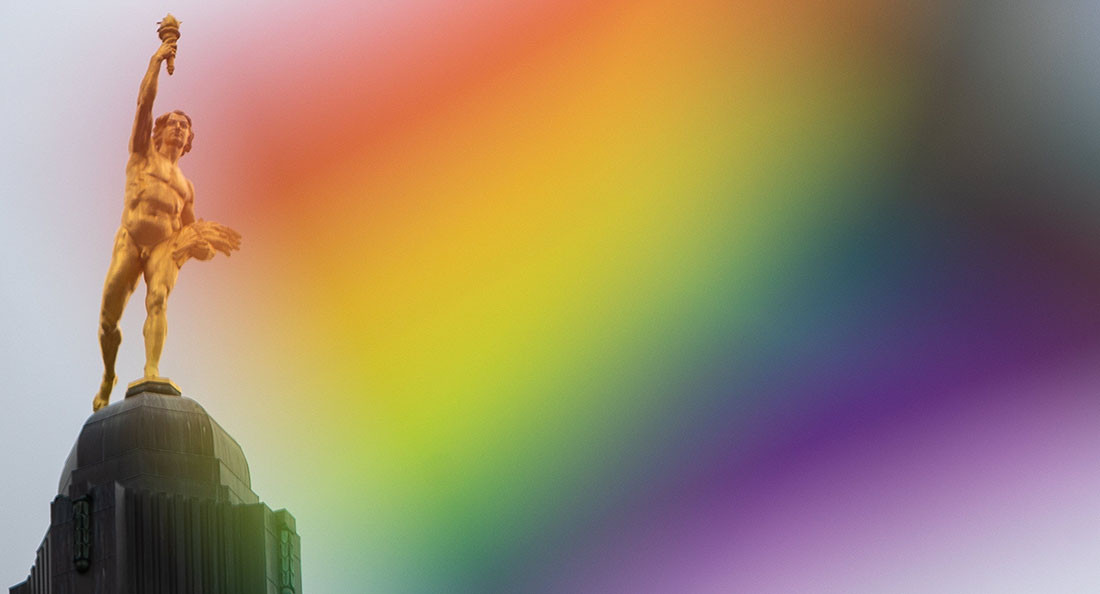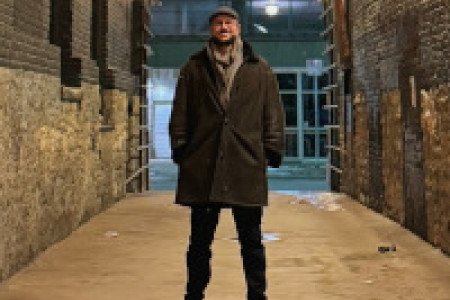Love is louder than the dog whistle
Combating anti-2SLGBTQ+ hate in Manitoba and beyond
Six years ago, Bryce Byron fled the United States for Canada amid a wave of transphobia.
After Donald Trump was elected president, Byron, a bisexual genderqueer who uses ze/hir pronouns, watched anti-2SLGBTQ+ rhetoric transform into government policy, threatening the livelihoods of queer and trans people across the nation.
Today, Byron, who works as a database manager at Rainbow Resource Centre, is witnessing an all-too-familiar tide of hate emerge in the country where ze sought refuge.
“What has been happening down in the States over the last six years is coming, and we are just seeing the very beginnings of it,” Byron says. “The language that’s being used by organizations like Action4Canada and the 1 Million March 4 Children (is) identical to the language that has been used in the US to push all sorts of really dangerous legislation.”
On Sept. 20, hundreds gathered on two sides of the Manitoba Legislature in protest and counter-protest during the 1 Million March 4 Children, a nationwide rally calling for the elimination of sexuality and gender curriculums, student pronoun changes and gender-neutral bathrooms from Canadian schools.
On the north side of the building, counter-protestors gathered in a sea of pride flags, chanting “Love is louder!” and “Protect trans kids!” The west side of the building told a different story.
There, a flock of “parental-rights” proponents raised Canadian flags and posters denouncing “gender ideology.” “Leave our kids alone!” they chanted.
As Canadians navigate the murky waters of the so-called parental-rights movement, 2SLGBTQ+ organizations and activists argue it’s a dog whistle to mask anti-trans and anti-queer rhetoric.
“This is very much a reactionary movement that’s looking to push our community back into the closet where we were prior to Stonewall and prior to the action of folks like Gays for Equality in organizing the first pride march in Winnipeg back in 1974,” Byron says. “It’s really looking to take us back over 50 years in our work for 2SLGBTQ+ liberation.”
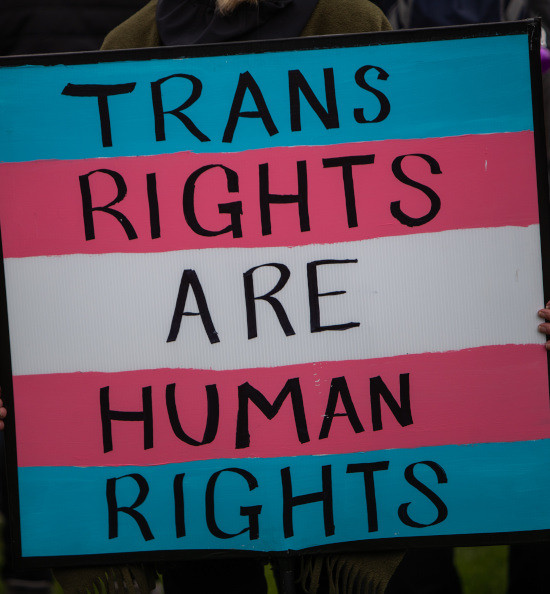
A demonstrator holds a protest sign at the Oct. 21 rally.
Blowing the dog whistle
Across Canada, policies requiring teachers to disclose and require parental consent for changes to students’ pronouns and gender identity have emerged.
In June, New Brunswick education minister Bill Hogan amended Policy 713 to require parental consent for teachers to use a student under 16’s preferred name and pronouns. In August, Saskatchewan Premier Scott Moe released a policy requiring teachers to do the same. The latter legislation was formally passed into law on Friday, Oct. 20.
The policies have been met with resistance from advocates across the nation. On Oct. 16, Saskatchewan human-rights commissioner Heather Kuttai resigned due to the province’s pronoun policies, which she described as “an attack on the rights of trans, nonbinary and gender-diverse children” in her letter to the premier. Additionally, the Canadian Civil Liberties Association (CCLA) has launched a legal challenge to New Brunswick’s Policy 713.
Ahead of the provincial election, the Manitoba Progressive Conservative (PC) Party began parroting the language of parental-rights advocates. The message plastered on Obby Khan billboards reading “parents know best” led some to believe they’d follow in the same direction of New Brunswick and Saskatchewan.
After the Manitoba NDP won a majority government in October, fears around parental-rights policies emerging in the province have been largely quashed. However, that doesn’t mean anti-2SLGBTQ+ hate has been stifled – far from it, advocates say.
This year, a series of right-wing advocacy groups, such as Action4Canada, lobbied governments across the country to combat what they believe is gender ideology in schools by scrapping Sexual Orientation and Gender Identity (SOGI) curriculums and policies under the guise of parental rights.
Hazel Woodrow, the education facilitator at the Canadian Anti-Hate Network, says much of the current anti-2SLGBTQ+ rhetoric is reminiscent of the far-right rhetoric of the early pandemic birthed from conspiracy group QAnon.
“We’re seeing a resurgence of ‘save the children’ or ‘save our children,’ and that was something we saw earlier on in the pandemic, but (it) dropped off a little bit in the last couple years,” Woodrow says. “It’s a real focus on a moral and a social panic about child sexual abuse.”
“Sometimes it is specific, in that they’re talking about queer and trans people being sexual predators... sometimes they are talking about a conflation of children coming into their identities as being trans through learning about gender from school, for example, and conflating that with child sexual abuse.”
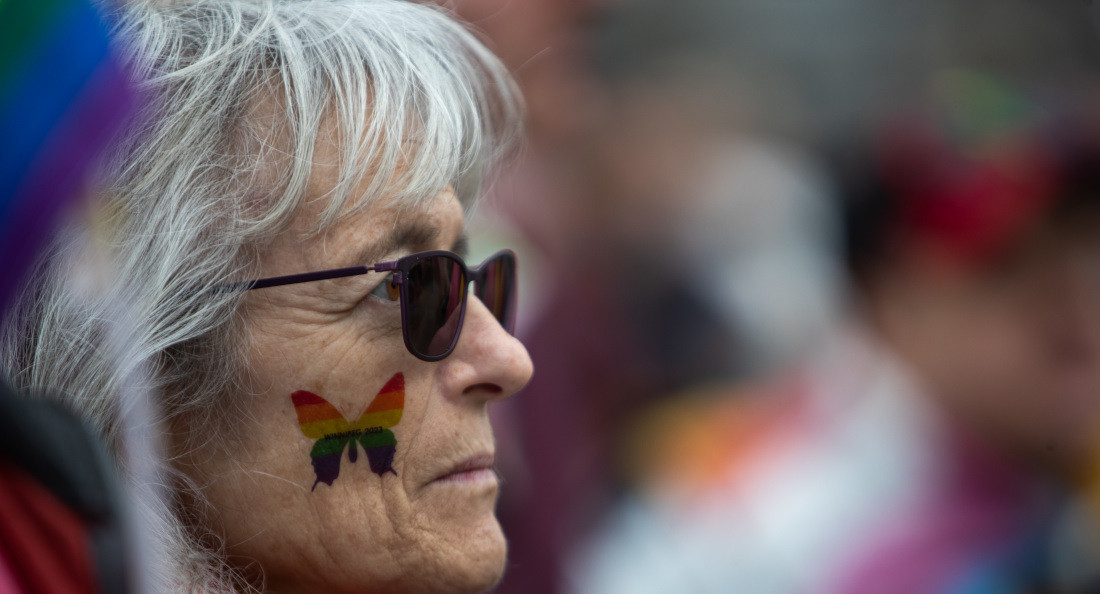
A protester with a rainbow temporary tattoo listens to speakers at the Oct. 21 rally for trans rights.
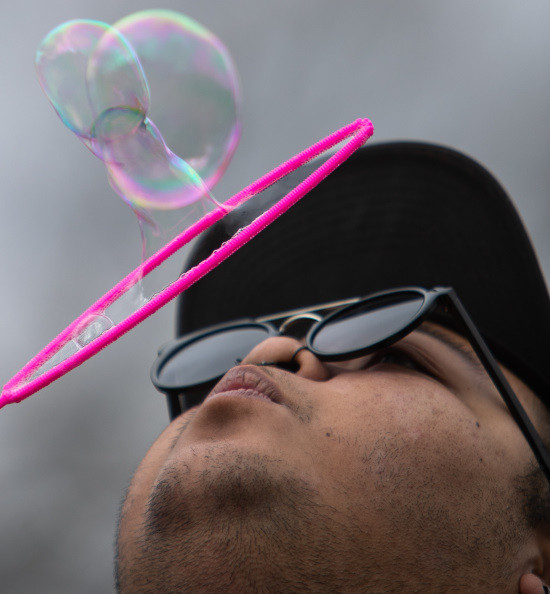
Nix Calma blows bubbles at the Oct. 21 rally for trans rights at the Manitoba Legislative Building.
In a column for Ricochet published earlier this month, writer and professor Aaron Saad argues that parental-rights rhetoric has “smuggled” anti- 2SLGBTQ+ hate from the fringe into mainstream politics.
“When presented too overtly, bigoted beliefs remain stranded on the fringe. And so there has to be some vehicle to smuggle them into everyday consciousness, one that covers them with a veneer of reasonableness,” Saad writes. “(T)he activism that culminated in the ‘1 Million March 4 Children’ could not openly present itself as anti-LGBTQ+; that would turn away too many people wanting to maintain they would never associate with bigots. The solution was to take a page from successful hate mobilizations of the past and make the cause about ‘parental rights.’”
Woodrow believes the parental-rights movement has expanded for numerous reasons. Primarily, it toys with the emotions of parents who have a vested interest in their children’s lives and wellbeing at school.
“It combines the stickiness and the just-feelsright-ness and just-makes-sense-ness of so-called parental rights as a concept with fear about abusing children,” Woodrow says. “We consider language (and) rhetoric that casts queer and trans people as child predators to be not just hate speech, but exceptionally inciteful hate speech because it’s incitement to action.”
Moreover, this isn’t the first time the rhetoric of parental rights has been weaponized against 2SLGBTQ+ rights. In 1977, Anita Bryant, a singer and pageant winner turned activist, spearheaded an anti-gay rights campaign called Save Our Children.
Through the campaign, Bryant fueled the idea that gay people were dangerous to children, resulting in a repeal of a law in Miami, Fla. protecting homosexual people from discrimination in employment, housing and public accommodation.
The law was later restored in 1998. Yet, in 2023, nearly a half-century after Bryant’s campaign, identical slogans have reemerged, fueling attacks on 2SLGBTQ+ rights in schools and beyond.
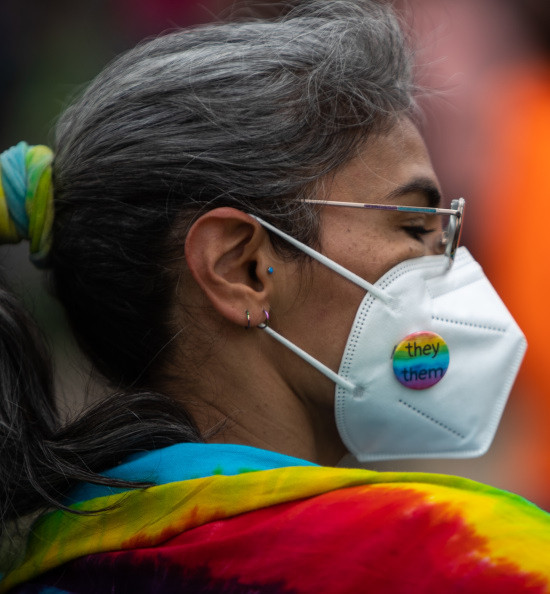
Yanna Windchime Courtney dances in rainbow attire at the Oct. 21 rally.
Combating and connecting
As anti-trans and anti-queer rhetoric materializes, student unions across Manitoba are mobilizing against 2SLGBTQ+ hate on campus.
“There’s a lot of frustration amongst the youth I’ve talked (to). There’s so much misinformation and disinformation, and some individuals have taken that to their advantage to target trans and queer youth,” Brie Villeneuve, the University of Winnipeg Students’ Association (UWSA)’s 2SLGBTQ* students’ director wrote in an email to The Uniter.
In March, Villeneuve organized a protest against a lecture at the university they feared would perpetuate transphobic views. The university ultimately went forward with the lecture in the name of academic freedom.
As the students they speak with express fears and frustrations, Villeneuve wants the university to work with the 2SLGBTQ+ community – not just the student union – to develop solutions.
“Many students I’ve talked with feel the university administration doesn’t have our backs. Words in supposed support (are) no longer enough, and (they) never truly w(ere),” they say. “2SLGBTQ+ students deserve to feel respected and feel safe on campus.”
In addition to his work as the University of Manitoba Student Union (UMSU)’s 2SLGBTQIA+ students’ representative, Alex Rana recently began organizing alongside the MB 2SLGBTQIA+ Student Action Coalition within the No Space for Hate Collective.
The collective, which was established ahead of the 1 Million March 4 Children counter-protest, is composed of more than a dozen 2SLGBTQ+ community organizations, student unions and allies. Together, they’ve organized two rallies in counter-protest of parental-rights marches.
“We did some help getting students out to the original counter-protests in September, and we’re organizing with all the other communities involved in the No Space for Hate rally,” Rana says.
Ahead of the Oct. 21 rally, Rana helped organize a poster-making workshop with the coalition. By connecting students with the cause, he sees strength in numbers.
“It’s unfortunate that we have to do this again after we did this last month, but I hope we have a good show of support,” Rana says.
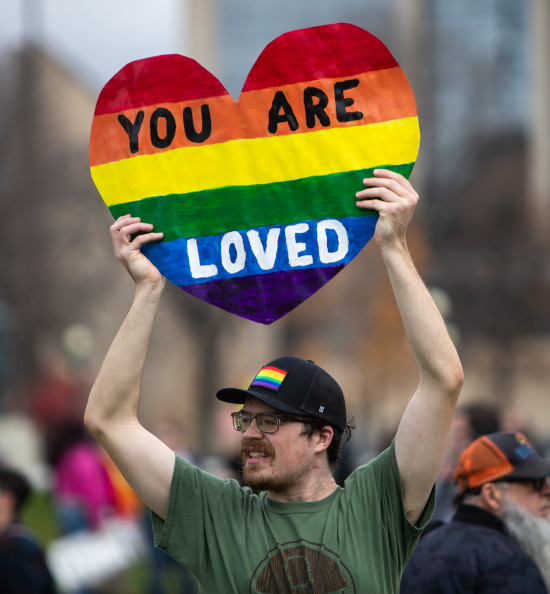
Pierce Marks Plikett holds a sign during a rally supporting trans rights at the Manitoba legislative grounds.
Love is louder
In the early afternoon of Oct. 21, hundreds gathered at the Manitoba Legislative Building grounds at the No Space for Hate rally.
After an energetic DJ set and welcoming remarks, the Feminist as Fuck marching band took to the steps, uniting the crowd in song and solidarity.
“Fight, fight, fight, fight, we don’t buy parental rights!” they chanted with the audience. “Win, win, win, win, we won’t go back to where we’ve been!”
Across the way at Memorial Park, a march in support of Palestinians formed. Some speakers drew connections between the two struggles for peace and liberation.
“We know it is our collective responsibility to provide a safe and accepting, inclusive environment for our youth, especially our queer and trans youth,” speaker Azka said. “We are here to celebrate their strength to live authentically, to show them that they are not alone, that they are cherished, and that they are loved.”
For Byron, there are two options for queer and trans people: disappearance or liberation. In hir eyes, it is in everyone’s interest to choose the latter.
“We need to be fully accepted. It’s not enough to simply have our rights guaranteed by a piece of paper in Ottawa,” ze says. “We need to be out here demanding that society accepts us as full human beings. And that is what’s being pushed back against.”
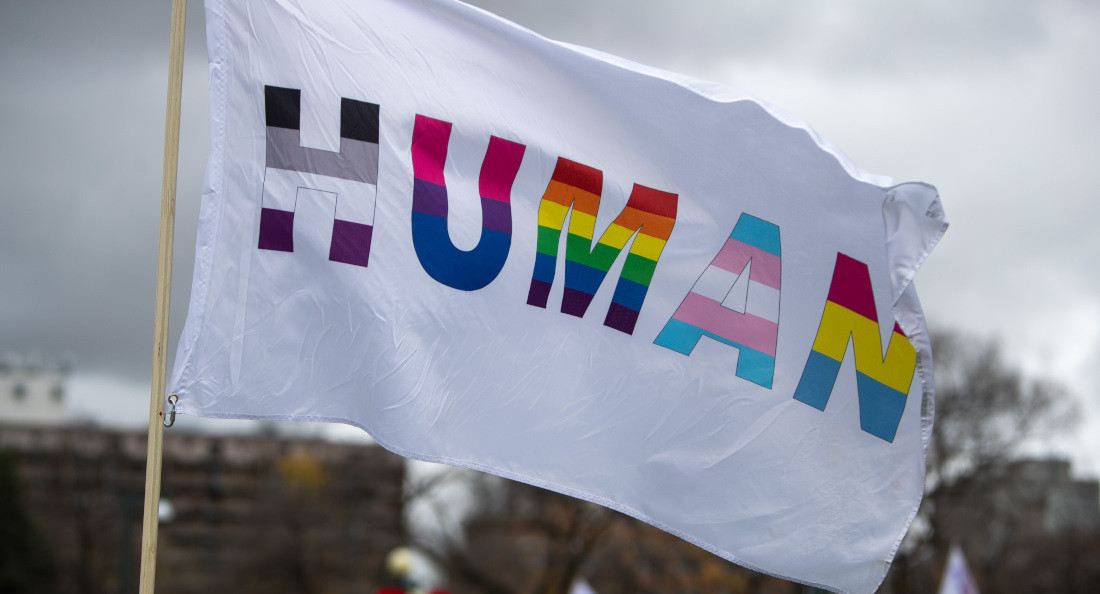
A protester waves a flag at the Oct. 21 rally for trans rights.
Published in Volume 78, Number 07 of The Uniter (October 26, 2023)

